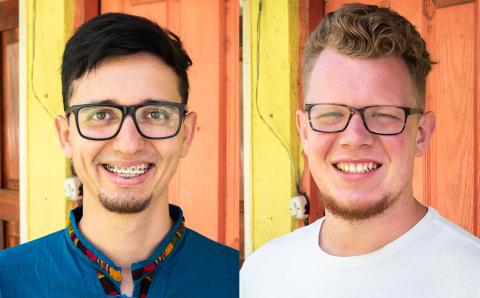Church leaders often discuss young people and how they can get them to hold onto their faith and stay in church. But how often do we take time to listen to what young adults have to say?
The Christian Reformed Church in North America takes this question seriously. Starting in 2009, youth observers aged 18-26 were invited to attend synod. In 2010, this idea was upgraded. The young adults who attend are now known as “young adult representatives” and have the privilege of the floor during synodical debates. Every year, they provide valuable insight into synodical discussions.
The denomination has tried other initiatives related to youth and young adults. In 2011, the CRCNA launched a Young Adult Leadership Taskforce; in 2013, the Engage Young Adult Conference convened in California; in 2017, Ron DeVries was hired by Faith Formation Ministries as a Youth Ministry Catalyzer; and there are now Youth Ministry Champions in 24 classes (regional groups of churches).
Building on this momentum, the CRCNA asked six young people what they want the church to know about themselves and their peers.
Some of these young people are Canadian; some are American. Some have been engaged in their churches for a long time. Others left the church after painful experiences and are just starting to find Christian community again. Some attend Christian universities. Others are students on secular campuses. Together, we hope they will provide a glimpse of the hopes and messages young people have for the church.
Be Intentional About Building Community
Isaac Veldhuis is studying engineering at the University of Waterloo in Ontario. He’s been inspired by being a part of a local church, which he refers to as a “community of believers” who are connected to one another.
“It has given me a space and a community who is willing to support my strengths and passions in the church,” Veldhuis said.
But it’s about way more than gathering once a week for a worship service. “I don’t want to just attend,” Veldhuis said. “I want to live life richly with others. I want to be able to invest.”
He sees this playing out throughout the week as he lives in an intentional Christian community on campus. Veldhuis believes young people like himself are looking for congregations who are open to mutual learning, who are cultivating faith formation, and who allow young people to contribute to and receive from the community.
Welcome Full Participation in the Church, Encourage Lament
Nate LeFebre is studying psychology and neuroscience at Calvin University in Grand Rapids, Mich. He credits the church with helping him discover his gifts in music.
“Shortly after I started to learn guitar, my church’s worship pastor took me under his wing and got me involved in worship. … His willingness to give (me) a meaningful role in worship gave me confidence in my gifts and shaped my enthusiasm for worship,” LeFebre said.
He continues to use that gift in the church. If he had one message to give the church, it would be to engage with young people even more. “Too often I feel like there is a perception among young people that ‘real’ church is what the older adults do, and young people are just along for the ride. Instead, involving young people in ‘real’ church—the difficult conversations, worship planning, missions, budget, etc.—empowers young people to engage in the life of the church.”
LeFebre also sees an opportunity for churches to make more room for lament. “Making space in worship to cry out against injustice and brokenness, to lament our struggles and burdens, encourages a more embodied and honest worship,” he explained.
Be Inclusive, Offer Equal Membership
John* is a 24-year-old graduate of Azusa Pacific University who is still trying to find that “perfect” job. He feels at home at Sojourn Grace Collective, a progressive nondenominational church in Pacific Beach, Calif., but his path to Sojourn included rejection from a few Protestant Christian communities.
This journey has made him reluctant to call his new home a ‘church.’ He prefers the term ‘community.’ “My community has inspired me with their commitment for social justice awareness and advocacy in the areas of immigration, racism, LGBT issues and progressive theology,” he said.
It’s his community’s inclusivity of young people and marginalized groups that drew him back to church. “Young adults are treated as mature adults by leadership, not as naive community members, and there are plenty of discussion groups where young adults are included for input. Their overall vibe is for equal treatment regardless of how much life experience one has,” he explained.
Extend Hospitality, Live Your Values
Jane*, a 24-year-old with a degree in biotechnology from a Christian university, said she’s never been inspired by a church. Instead, she has been “way more inspired by individual Christians who have modeled faithful living.”
Jane pointed out that if church leaders want to engage her and her peers in the life of the church, they should “design an environment that is welcoming and accepting.” She said it doesn’t need to necessarily be filled with people her age, but it must have a hospitable feel.
She noted that churches with ethnic diversity in their membership tend to be better at enfolding new people. “I think it’s because they know what it feels like to be ostracized.” She also said it’s important that the church “find true values that it stands by and never compromise on those values.”
Engage Difficult Issues
Hayley Topp is pursuing a degree in early childhood studies at the University of Guelph-Humber in Toronto, Ont. She said the pastoral staff at her church, Community Kitchener CRC, are fantastic because “they allow me to have doubts and a sense of knowing that I don’t have to be perfect to be accepted.”
She appreciates her church’s willingness to engage the difficult issues. “About a year or so ago, my church did the Blanket Exercise (an interactive tool that walks participants through the history of relationships between Indigenous and non-Indigenous peoples in Canada). There were a variety of people and they held different viewpoints, yet I was happy to see people share and grow and learn, even in a difficult theme.” (The blanket exercise was created by KAIROS Canada and is facilitated by the CRC Canadian Indigenous Ministry Committee.)
Topp’s message to her church is to continue to press into these challenging conversations. “Find a way to have open conversations,” she said. “We need an understanding of all the issues, from all perspectives.” She added that churches should also give young people a voice: “View us not as people with limited life experience, but as someone with a different life experience.”
Be Biblically Rooted, Have Tough Conversations, Celebrate the Holy Spirit
Lauren Holwerda is studying English education and music at Calvin University in Grand Rapids, Mich. She credits her church and her elementary school for helping her see the importance of being biblically rooted, and she said this has helped her to discern the messages of church and culture today.
She sees great opportunity for the church to continue to engage young people by “providing a space to talk openly about difficult questions.”
“In a time when there is much freedom to ‘live your truth’ and ‘you do you,’” Holwerda said, “the need for conversations about real truth is imperative, specifically surrounding homosexuality, money, and around popular culture in regard to music and art. I think many young people aren’t aware of the CRC’s stance on these issues or how to approach them wisely in their contemporary shades.”
Holwerda also said that “despite the life-bringing traditions and liturgies of the CRC, I think the CRC sometimes fails to celebrate the dynamic presence of the Holy Spirit. Dependence on the Holy Spirit opens doors for rich community, opportunities to serve in ways we’re not aware of on our own, and a greater magnification of God’s glory as he works among us.”
So Now What?
Mary Hulst is the Calvin University chaplain. At Inspire 2019, a conference for ministry leaders and volunteers in Windsor, Ont., Hulst gave a plenary talk** about young adults that might provide congregations with some suggestions for moving forward:
Our younger leaders are asking us to trust them: trust them to lead, trust them to plan worship, trust them with hard conversation, trust them with the budget, trust them to love the church as much as their elders do. What we hear in their writing is not a rejection of the church, but a longing for the church to be the church: to welcome the outcast, to draw us deep into Scripture, to call us to live differently with our money, sex, power, and time than the culture asks of us. Our young leaders are hungry for the church to be more.
This is inspiring! They actually believe that the church of Jesus Christ can do these things, and our young leaders want these things. They want communities of faith that challenge them, and encourage them, and show them what it really looks like to follow Jesus. They want to move with us toward the hardest conversations about race, sexuality, popular culture, immigration, politics, or poverty, but not in the way they hear and see in the media. They want to engage in these conversations as followers of Jesus Christ.
Have you had congregational conversations about these topics in ways that foster community and appreciate difference? Is the preaching in your church explicitly biblical, theologically Reformed, and engaging with culture? How is your local congregation engaging the passions of young leaders? Is anyone under the age of 40 on the elder team? Are those who lead worship all over the age of 18? Could your classis begin a young adult, post-college shared ministry that creates space for them to ask the hard questions, receive wise counsel, and love Jesus more?
Our young leaders are crying out for more. It’s time for us to listen. And change.
*Not their real names
**Find Mary Hulst’s plenary talk at network.crcna.org/crcna-and-synod/inspire-2019-audio-recordings.
About the Authors
Paola Fuentes Gleghorn
Matt Kucinski is media relations manager at Calvin University.







